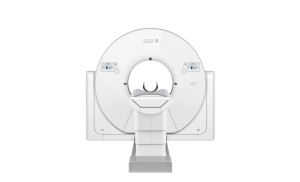United Imaging launches AI-empowered 640-slice, 82-cm bore CT at RSNA
by John R. Fischer, Senior Reporter | December 02, 2020
Artificial Intelligence
CT
X-Ray

uCT ATLAS
United Imaging unveiled its uCT ATLAS ultra-wide bore CT at this year’s 2020 Radiological Society of North America annual meeting.
The 510k-pending, 640-slice CT is fitted with an 82-cm bore for enhanced comfort and an AI-empowered workflow that provides it with a 0.25-second rotation speed, a low-dose 60 kVp capability and other features that improve positioning and make exams simpler.
“It will be a full-service scanner. The speed of the system will certainly have customers who are interested in looking at it for cardiac applications, in particular for the emergency room,” Jeffrey Bundy, CEO of United Imaging Healthcare Solutions, told HCB News.

 The solution is equipped with the uAI Vision integrated 3D camera which tracks the patient in the room and does a 3D deep learning-based segmentation of the body. By automatically detecting where different body regions are, it can more accurately position the patient on the scanner.
The solution is equipped with the uAI Vision integrated 3D camera which tracks the patient in the room and does a 3D deep learning-based segmentation of the body. By automatically detecting where different body regions are, it can more accurately position the patient on the scanner.
It also consists of a 16 cm detector and a 700-lbs table weight capacity for greater comfort, as well as the ability to perform total stroke imaging and a one-rotation cardiac capability that helps it to perform single heartbeat imaging. Its AI offerings enable it to perform multiple tasks, including freezing the motion of coronary arteries or cardiac valves for managing irregular heart rates when scanning.
“The advantages of the AI we’re applying both in the acquisition period and reconstruction period are focused on being able to use the deep learning approaches to capture the data in the diastolic phase of the motion, retrospectively, using deep learning to capture those phases so we can reduce the motion,” said Bundy.
They also aid in dose modulation and reconstruction, he says. “One of the big disadvantages with model-based iterative reconstruction is that it's so computationally heavy that it makes it difficult to make it practical and usable. Our approach is to apply AI and deep-learning with model-based iterative reconstruction and make the computation times practical enough to be used in the clinical environment.”
In addition to the launch of uCT ATLAS, United Imaging also announced new partnerships that enable it to offer Resoundant’s advanced magnetic resonance elastography (MRE) on its MR systems, and distribute its diagnostic imaging solutions to Intalere members.
The 510k-pending, 640-slice CT is fitted with an 82-cm bore for enhanced comfort and an AI-empowered workflow that provides it with a 0.25-second rotation speed, a low-dose 60 kVp capability and other features that improve positioning and make exams simpler.
“It will be a full-service scanner. The speed of the system will certainly have customers who are interested in looking at it for cardiac applications, in particular for the emergency room,” Jeffrey Bundy, CEO of United Imaging Healthcare Solutions, told HCB News.
We repair MRI Coils, RF amplifiers, Gradient Amplifiers and Injectors.
MIT labs, experts in Multi-Vendor component level repair of: MRI Coils, RF amplifiers, Gradient Amplifiers Contrast Media Injectors. System repairs, sub-assembly repairs, component level repairs, refurbish/calibrate. info@mitlabsusa.com/+1 (305) 470-8013

It also consists of a 16 cm detector and a 700-lbs table weight capacity for greater comfort, as well as the ability to perform total stroke imaging and a one-rotation cardiac capability that helps it to perform single heartbeat imaging. Its AI offerings enable it to perform multiple tasks, including freezing the motion of coronary arteries or cardiac valves for managing irregular heart rates when scanning.
“The advantages of the AI we’re applying both in the acquisition period and reconstruction period are focused on being able to use the deep learning approaches to capture the data in the diastolic phase of the motion, retrospectively, using deep learning to capture those phases so we can reduce the motion,” said Bundy.
They also aid in dose modulation and reconstruction, he says. “One of the big disadvantages with model-based iterative reconstruction is that it's so computationally heavy that it makes it difficult to make it practical and usable. Our approach is to apply AI and deep-learning with model-based iterative reconstruction and make the computation times practical enough to be used in the clinical environment.”
In addition to the launch of uCT ATLAS, United Imaging also announced new partnerships that enable it to offer Resoundant’s advanced magnetic resonance elastography (MRE) on its MR systems, and distribute its diagnostic imaging solutions to Intalere members.
You Must Be Logged In To Post A CommentRegisterRegistration is Free and Easy. Enjoy the benefits of The World's Leading New & Used Medical Equipment Marketplace. Register Now! |
|










